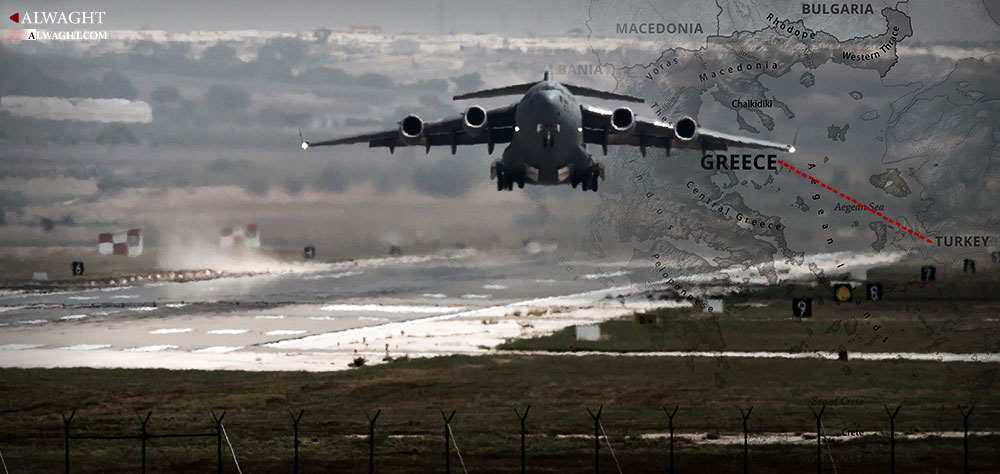Alwaght- Since the Second World War, US-Turkey relations have never experienced a period as chilly as the present time. Over the past two years, the Turkish President Recep Tayyip Erdogan and other officials repeatedly harshly attacked Washington, accusing it of being hostile to Turkey’s national interests and endangering the West Asian Country's national security. The disputes have been highly serious in the past few months, giving rise to speculations about US forces’ possible evacuation of the Turkey's Incirlik military base and moving to Greece. Incirlik has been used for the US air operation in Syria and other spots. In the past few days, the Greek media and other Western media published reports about the US intention to replace a Greek air base with that of Turkey. Latest reports suggest that the US intends to relocate its existing forces and military facilities in the Turkish base to Andravida air base in southern Greece.
The root cause of the deterioration of the Washington-Ankara ties in 2016 should be sought in the tensions over the controversial air base. On July 15, 2016, a failed military coup sought to overthrow President Erdogan and his ruling Justice and Development Party. A couple of days after the botched attempt, Erdogan was provided with documents signaling that the Americans had supported the army mutineers. The evidence claimed that the CIA held contacts with the coup leaders, who received Washington’s agreement to allow two stolen F-16 fighter jets to take off from Incirlik air base and bomb the country’s parliament building.
Following the development, Erdogan coarsely blasted the US, asserting that he just knew who was his enemy and who was his friend. Not long after the anti-US criticism, Erdogan traveled to Moscow to meet his Russian counterpart Vladimir Putin for repairing the troubled ties with Moscow which followed the Turkish shooting down of the Russian bomber in Syria in 2015. The visit to Russia marked the start of the Erdogan’s pessimism about the US policies towards his country. Washington and Ankara conflicts over Syria, Turkish-Russian closeness, and general differences over West Asia policies pressed down the two allies’ ties to the lowest level in years.
Regarding the abovementioned explanations reasons behind Trump’s decision to relocate US forces from the Incirlik base can be accounted as following:
1. Issuing ultimatum to Turkey
Analysts hold that the possible relocation comes in the form of a veiled ultimatum to the Ankara leaders as the US intends to move their forces to a country with long history of hostility to Turkey. Trump looks assertive in passing the message to the Turkish leaders that if the current tensions with Washington continue, the US will find a replacement to their base in Greece, which is essentially a fierce regional rival to Turkey. But the US will materialize its relocation plan under specific conditions, namely when the administration feels that its hope in renewed warm ties with Ankara is forlorn and a several-decade alliance with the Turks is over. Still, one issue should be taken into account: Americans do not want to easily lose an ally as strategic as Ankara and its crucial Incirlik air base. On the other side, the Turkish leaders do not want to put an end to their alliance with the US. They have the full conviction that a hefty chunk of their interests is realizable in a context of partnership with the West in general and the US in particular.
2. Saving US military hegemony
Some link the US plan to build a new military base in Greece to Washington’s efforts to preserve its military hegemony in Eastern Europe region. Evacuation of the Incirlik base can deal a big blow to the US logistical position in West Asia and Eastern Europe. Sir Harford Mackinder, a prominent British geographer and politician, labeled Eurasia region “Heartland”, or the heart of the world, adding that any country which can control this region can genuinely dominate the whole world. Incirlik crucially served the US in its rivalry against the Soviet Union in the decades before the 1990s. After the collapse of the Soviet-led Eastern Bloc, which took on the US-led Western Bloc in a bipolar world, Americans used the same base as an efficient instrument bolstering Washington’s military might in the face of Moscow in the highly sensitive Eurasia. In the event of US military withdrawal from the heavy-duty Turkish base, Washington should expect huge risks to the logistical position of its forces in this part of the world. Aware of this reality, Washington builds a massive presence in Greece in compensatory efforts.
Greek Pro News website has recently published a report about the US military plans in Greece, maintaining that in addition to moving their forces from Incirlik to Andravida base, Americans are setting the plans to build six new military bases in the country or enhance the operational capacity of those already operating. Athens-based Estia newspaper also reflected the US plans for a military buildup in Greece. Estia wrote that the US eyes establishing two new bases in Greece, one in Cyclades island in southeastern Greece close to the Turkish territorial waters, and the other in Imia, a series of inhabited islets in the Aegean Sea just miles away from the Turkish waters over which Turkey and Greece are at loggerheads. Some reports also emerged about US program to build a base in Kalymnos island in southwestern Greece and another one in Syros island southeast of the country. The US ambassador to Athens Geoffrey R. Pyatt several times highlighted the significance of Syros island. He recently visited the island twice to examine the possibility of building a military base there. Washington currently runs a base in Souda town in Crete island and another in the city of Larissa in Greece’s north, each has an operational NATO military base around. So, Greece is slated to serve as a strategic platform in the US military hegemony-saving efforts in the upcoming year.



























